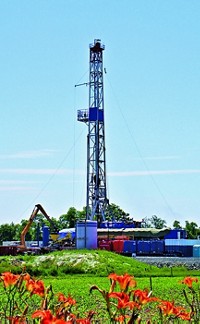Advertisement
Grab your lab coat. Let's get started
Welcome!
Welcome!
Create an account below to get 6 C&EN articles per month, receive newsletters and more - all free.
It seems this is your first time logging in online. Please enter the following information to continue.
As an ACS member you automatically get access to this site. All we need is few more details to create your reading experience.
Not you? Sign in with a different account.
Not you? Sign in with a different account.
ERROR 1
ERROR 1
ERROR 2
ERROR 2
ERROR 2
ERROR 2
ERROR 2
Password and Confirm password must match.
If you have an ACS member number, please enter it here so we can link this account to your membership. (optional)
ERROR 2
ACS values your privacy. By submitting your information, you are gaining access to C&EN and subscribing to our weekly newsletter. We use the information you provide to make your reading experience better, and we will never sell your data to third party members.
Environment
Fracking Wastewater Restrictions Proposed
by Jessica Morrison
April 13, 2015
| A version of this story appeared in
Volume 93, Issue 15
Sending wastewater from hydraulic fracturing operations to municipal sewage treatment plants is neither technologically or economically practical, but the Environmental Protection Agency is moving to prevent it in the future. The agency proposed a rule last week that would prohibit the discharge of fracking wastewater to publicly owned sewage plants. The agency says the action is needed because unconventional oil and gas extraction facilities have sent wastewater to sewage plants in the past, so the potential remains for some to do so in the future. At a single fracking well, millions of gallons of water may be injected deep underground to release natural gas or petroleum from rock formations. A significant part of that water returns to the surface. Many times saltier than seawater, wastewater from fracking includes organics, metals, and radioactive materials that municipal sewage treatment plants are not designed to remove. Fracking companies sometimes opt to store wastewater on-site for private treatment and reuse for future fracking operations, but the common choice is to dispose of it in underground injection wells.






Join the conversation
Contact the reporter
Submit a Letter to the Editor for publication
Engage with us on Twitter